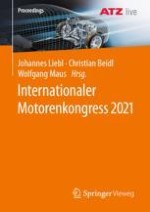2021 | OriginalPaper | Buchkapitel
Heavy-Duty Combustion Engine 2030: Which Concepts can Contribute to Achieving the CO2 Targets for Commercial Vehicles?
verfasst von : Hubertus Ulmer, Tom George, Reza Rezaei, Jan Böhme, Jörn Seebode
Erschienen in: Internationaler Motorenkongress 2021
Verlag: Springer Fachmedien Wiesbaden
Aktivieren Sie unsere intelligente Suche, um passende Fachinhalte oder Patente zu finden.
Wählen Sie Textabschnitte aus um mit Künstlicher Intelligenz passenden Patente zu finden. powered by
Markieren Sie Textabschnitte, um KI-gestützt weitere passende Inhalte zu finden. powered by
The transportation industry has to face major challenges, because of global efforts towards a reduction of greenhouse gases and a general tendency towards decarbonisation. The EU reduction targets for example stipulate an OEM specific fleet CO2 decrease of 30% by 2030. Furthermore, future emission legislation will potentially require measures for ultra-low NOx. In this context, multiple technology scenarios ranging from cabin & vehicle design, efficient conventional combustion engines to hydrogen combustion engines and electric powertrain concepts can be expected in the future. From total cost of ownership and representative fleet composition calculations, IAV has derived possible scenarios for a future heavy-duty powertrain configuration: a high efficiency diesel powertrain using mechanical, thermodynamic and thermal management measures in a mid-term, and an advanced engine design for hydrogen combustion and eFuels in a long-term scenario.
